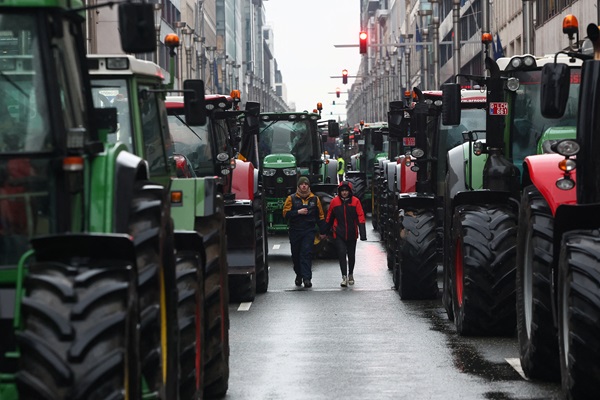 Tractors during a protest of European farmers over price pressures, taxes and green regulation, on the day of an EU Agriculture Ministers meeting in Brussels, Belgium, 26 February 2024.;
Credit: REUTERS/Yves Herman
Tractors during a protest of European farmers over price pressures, taxes and green regulation, on the day of an EU Agriculture Ministers meeting in Brussels, Belgium, 26 February 2024.;
Credit: REUTERS/Yves Herman
BRUSSELS/MADRID/WARSAW (Reuters) - On Monday 26 February 2024, farmers blocked a border crossing between Poland and Germany, threw bottles at police in Brussels and gathered in Madrid to demand action on cheap supermarket prices and what they say is unfair competition from abroad.
Agricultural ministers from across the European Union pledged to do more to cut red tape and help farmers as they convened in Brussels to discuss the crisis in the sector after weeks of angry protests.
The 27-nation EU has already weakened some parts of its flagship Green Deal environmental policies, removing a goal to cut farming emissions from its 2040 climate roadmap. But farmers are demanding more.
"We're here again in Brussels today as farmers because the European Union is not listening to our demands. Our demands are for fair revenue," said Morgan Ody, general coordinator of farming organisation La Via Campesina. "We produce the food and we don't make a living. Why is that? Because of free trade agreements. Because of deregulation. Because the prices are below the cost of production. So we demand the EU to move on this."
On the margins of the Brussels rally, riot police fired water cannon at protesters throwing bottles and eggs, while about 900 tractors jammed parts of the Belgian capital, not far from the cordoned-off area where ministers were meeting.
At a protest in Madrid, farmers from across Spain blew whistles, rang cowbells and beat drums, urging the EU to loosen regulations and drop some changes to its Common Agriculture Policy (CAP) of subsidies and other programmes.
"It's impossible to put up with these rules, they want us to work in the field during the day and deal with paperwork at night - we're sick of the bureaucracy," said Roberto Rodriguez, who grows cereal and beetroots in the central province of Avila.
IMPORTS FROM UKRAINE
In Poland, farmers angry with cheap imports from non-EU Ukraine blocked the A2 highway at a border crossing with Germany. The EU decided two years ago to waive duties on Ukraine's food exports as Kyiv battles a Russian invasion.
"This is a show of common solidarity, that both Polish and German farmers will not allow these goods from Ukraine to continue to enter the European market," said Adrian Wawrzyniak, a spokesperson for the Solidarity farmers' union.
The EU aims to find a more effective solution so that farm products from Ukraine go to their traditional markets outside the EU, Belgian Agriculture Minister David Clarinval said after the ministerial meeting.
The agriculture ministers also debated a new set of proposals to ease financial pressures on European farmers, including a reduction in farm inspections and the possibility of exempting small farms from some environmental standards.
They asked the European Commission, the EU's executive, to make more ambitious proposals on cutting red tape, Clarinval said.
TIME AT DESK
German Agriculture Minister Cem Ozdemir said the EU needed to ensure farmers could earn good money if they opted for biodiversity and green measures, referring to existing EU farm policy as a "bureaucracy monster". "The average farmer spends a quarter of their time at their desks," he said.
The EU has already scrapped over the past weeks a goal to cut farming emissions out of its 2040 climate roadmap, and has also withdrawn a law to reduce pesticides and delayed a target for farmers to leave some land fallow to improve biodiversity.
At the Madrid protest, some farmers said they just wanted to be allowed to use the same pesticides as counterparts outside the EU whose goods are imported into the bloc.
"We want to compete with the same deck of cards," said Juan Carlos, a 54-year-old sunflower oil producer. "If they use a certain product (to fumigate), I want to be able to use the same one."
Grievances vary from country to country, and not all farmers call for an end to green rules. La Via Campesina's Ody called on the EU to set up minimum support prices. "We are not against climate policies. But we know that in order to do the transition, we need higher prices for products because it costs more to produce in an ecological way," she said.








